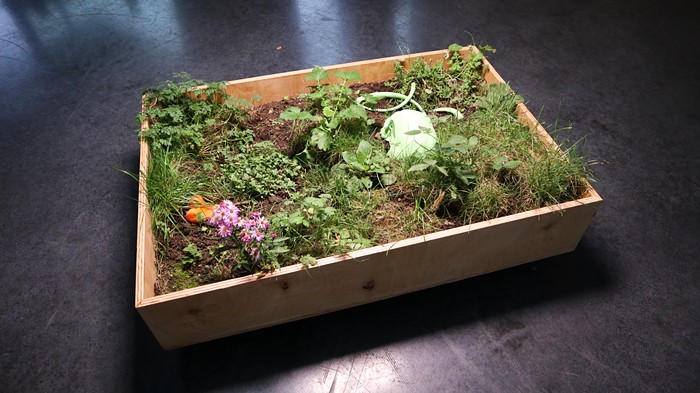When I made a similar comment nearly three years ago, I was roundly excoriated by a flood of offended letters that insisted on the pure pleasure of landscape viewing and painting (and on my concomitant moronity). That it's clearly not all right to identify an ambivalence about the natural world (about the relationship we claim to it, about the claims we stake on it, about the frame--by necessity--that art puts around it) seems to me a kind of denial, but I suppose it's possible that the denial (cynical, jaded, pooh-poohing) is mine.
And then I think it's possible to do both at once, but you would have to have a kind of dry sense of humor about it. Lanny DeVuono does so with large, square, unstretched canvases with lovely landscapes, some with signs of human presence, framed by a prominent black band. The images are natural, at times just a dab impressionistic--especially where sky is concerned--and as a group they acknowledge the various ways a viewer can see a landscape or its image. Some of them recall the kind of photographic lens that restores the curve to the earth, a kind of camera obscura image that also has elements of time-lapse photography. Others are privileged views, such as treetops seen from below, as though you were lying childlike on the ground. DeVuono's aim doesn't seem to be to make you comfortable in this setting but to tug at the idea of seeing, here by adding single words to most of her paintings.
Ed Ruscha has done this kind of thing--disturbing the pristine visual waters with language--in various forms, but his intent has felt more intrusive than meditative. Where his sword is the penetrating sign, DeVuono's is the subliminal but somehow obvious message, both clear and not, embodied in a single word (her text, too, is painted in a delicate slant). Each word she uses ("cleave," "lot," "will") is as nuanced as it is nonsense--"cleave," of course, can mean both to split and to cling together. The result is a suggestion of meaning, not as confounding as Ruscha's, but more leading.
The result corresponds to the experience of seeing, and the usually subconscious practice of applying words to what you see. The words don't necessarily make sense, but they remind you that we're not simply responding to visual stimulation but to a whole host of associations, allusions, items out of our personal history. Her landscapes become the very opposite of innocent, even though they have a kind of innocent beauty, because they remind us that every image is mediated.
DeVuono's current show also includes a cluster of smaller works painted on wooden boxes, so that they substantially stand out from the wall, becoming, in essence, chunks of land and sky. A pair of them--each a compact 6" by 6"--seem carved right out of a lawn; one is faintly inscribed "use," and the other is blank. This neat next step has a nice philosophical logic to it: Painting turns landscape into an object--might as well really make an object out of it (and to emphasize this point, each box is painted on its sides).
On the largest of these boxes--a long, horizontal view of a distinctly non-sublime landscape: a narrow road with a road sign, the road cutting through some kind of grassland--the word "between" descends from the sky in unusually bright red, like the cross appearing to Constantine. I'm not sure what this might mean; it actually reminds me of the kind of graphic The Electric Company would use to demonstrate to young readers what a word signified. But that here it denotes a lowly road cutting through an anonymous field, not exactly the stuff that sublimity is made of, makes me like it all the more.


















